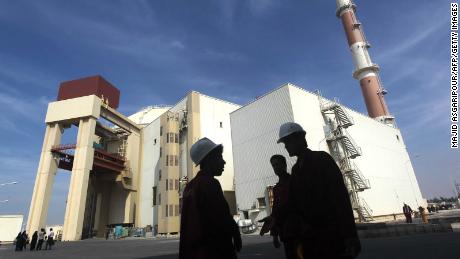But while declaring its independence from the JCPOA, Iran has not articulated any intention to race towards weapons-grade uranium.After a cabinet meeting in Tehran, Iran announced Sunday that it would no longer limit itself to the restrictions contained in the deal, known as the Joint Comprehensive Plan of Action or JCPOA. The deal was implemented in 2016, freezing Iran's nuclear program in return for a progressive lifting of international sanctions. The announcement said "Iran will set its limits based on its technical needs," essentially rendering the JCPOA redundant if technically still alive.It was the fifth step in Iran's graduated divorce from the nuclear deal, the latest stage in a gradual chipping away at its provisions that began last July in response to US withdrawal from the deal and re-imposition of tough sanctions.Essentially Iran no longer recognizes any limits on the operational aspects of its nuclear program; including in enrichment capacity, the extent (or degree) of enrichment, and nuclear research and development.In other words, Iran is prepared to let its nuclear centrifuges spin.But it also held out an olive branch. Foreign Minister Mohamed Javid Zarif tweeted: "This step is within JCPOA & all 5 steps are reversible upon EFFECTIVE implementation of reciprocal obligations. Iran's full cooperation w/IAEA will continue."A separate statement said Iran would "continue to work with international nuclear agencies and will return to JCPOA limits once all sanctions are removed from the country."Analysts noted that even as the JCPOA lurches towards irrelevance, Iran has shown a measure of self-restraint.Hans Kristensen, Director of Nuclear Information Project at the Federation of American Scientists said "This does not (yet) mean Iran is leaving JCPOA or building nuclear weapons.""Apparently, other limits of agreement are still in place as is IAEA inspections," Kristensen tweeted."Its 5th step away from its JCPOA commitments is less harsh than the initially feared resumption of 20% enrichment," tweeted Ali Vaez, Director of the Iran Project at the International Crisis Group. "This shows Iran still wants the Europeans on its side and doesn't want to break the deal yet."Eric Brewer, a former official at the US National Security Council, agreed. He told CNN: "They've clearly left themselves room to maneuver," Brewer said. "And they clearly chose not to come out with something more aggressive in the wake of Soleimani's death – like increasing enrichment to 20%."Brewer said that the bigger question "is whether Iran acts on this announcement by adding more centrifuges." That could potentially push it closer to developing a nuclear weapon. What matters is what Iran does next.Michael Singh, a senior director at the Washington Institute and formerly a senior director for the Middle East at the NSC, told CNN: "If it is just an announcement in principle, that they do not consider themselves bound by the JCPOA, it will be met with a shrug by the US and others." But "If they follow it up and take actions to increase the levels by which they enrich uranium or increase their stockpile that will actually bring down the breakout time."Vipin Narang, Associate Professor of Political Science at MIT, points out that despite Iran's announcement that it won't abide by enrichment levels and quantities set by the JCPOA, "it is still quite far from having enough enriched uranium for a bomb, let alone a functional arsenal because…of the JCPOA."
A deal undone
The Trump Administration unilaterally abandoned the JCPOA on May 8, 2018."This was a horrible, one-sided deal that should have never, ever been made," Trump said as he withdrew from the deal. "It didn't bring calm, it didn't bring peace, and it never will."The other parties to the deal — China, Russia, the Europeans and Iran — disagreed and stayed the course. But the reimposition of draconian sanctions by the US, sanctions that had been largely lifted as Iran's reward for signing up to the deal, gnawed away at its credibility. As tensions grew, the agreement known as the JCPOA began to fray at the edges. The Trump administration's policy of "maximum pressure" against Iran, which began after that May statement, included crippling sanctions against its financial and oil sectors. President Hassan Rouhani said last week that the US "economic war" against Iran had cost the country $200 billion. Iran has lost nearly 90% of its oil exports, a key source of revenue; the value of the rial has plummeted, and the banking sector is under stress. Even though the sanctions exempted essential supplies, widespread shortages of food, medicine and medicinal goods have been reported throughout Iran.Tehran responded to the US measures with what it called "strategic patience" — while nagging the Europeans to make up for the effect of US sanctions.President Emmanuel Macron of France tried to smooth the waters, proposing a $15 billion credit line for Iran in return for its full adherence to the JCPOA. He also welcomed Iranian Foreign Minister Mohammad Javad Zarif to the G7 meeting in August and tried to engineer a meeting between Trump and Iranian President Hassan Rouhani at the UN General assembly.But the dynamics were moving in the opposite direction. As the noose tightened on Iran's oil exports, it retaliated on several fronts: attacks on oil tankers in the Gulf (by its own or proxy forces), a growing drumbeat of rocket attacks against US forces in Iraq, and most spectacularly the cruise missile attacks against Saudi oil plants in September.The message was simple — if we can't sell our oil and gain the proceeds, we will try to ensure others can't either.



